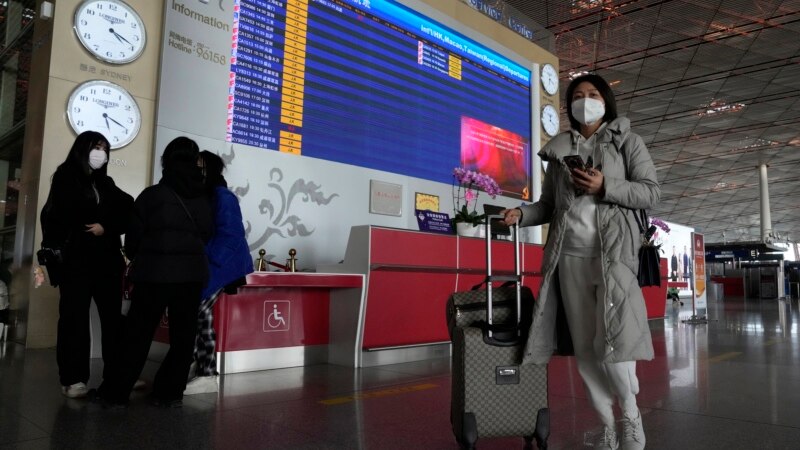COVID Restrictions Lifted, China’s Businesspeople Hit the Road to Revive Export Economy

Yiwu, a city in China’s Zhejiang province, produces more than half the world’s Christmas ornaments purchased by the billions of people who celebrate the holiday.
China’s “zero-COVID” policy, coupled with global pandemic fears, dulled the local export-fueled year-round glitterfest. Christmas orders fell by 50% in 2020, according to the official Global Times with raw material costs and labor shortages hindering a recovery in 2021, which saw only a 10% to 20% increase in sales over the previous year.
Then, faster than elves could hitch those nine reindeer to Santa’s sleigh, a day after Beijing began lifting zero-COVID restrictions on December 3, a Zhejiang trade delegation departed for Germany and France to launch the “Thousand Missions and Ten Thousand Enterprises to Expand the Market and Grab Orders Action.” The goal: Sell enough stuff to help spark China’s economy back to pre-pandemic growth.
They hit a snag. “It seems like the Europeans’ and Americans’ purchasing power is so weak now. If the markets there are weak, China’s economy is definitely suffering too,” said Steven Gao, a businessman in Zhejiang province who exports Christmas ornaments and other trinkets to Europe and the U.S.
Beyond pandemic aftereffects such as not-yet-normal supply chains, Gao blames the bleak economic prospect on President Xi Jinping’s recent policies, particularly his focus on “common prosperity” during the 20th party congress, which met in October in Beijing and gave him a third term. The phrase refers to an official effort to address income inequality, a push often linked to personal wealth accumulated by founders and executives in sectors such as tech.
“Many of my rich friends are thinking about moving to other countries,” said Gao, 45, who asked to use a pseudonym to avoid attracting official attention when he spoke with VOA Mandarin on Tuesday. “They are afraid their wealth will be seized. This lack of faith, combined with pandemic control, led to the slide of economic growth.”
According to a CNBC report on December 4, U.S. manufacturing orders in China are down 40%, according to the latest CNBC Supply Chain Heat Map data, and Chinese factories are expected to shut down two weeks earlier than usual for the Lunar New Year that falls on January 22, 2023.
When Xi presided over a December 6 meeting of the Politburo of the Communist Party, China’s second-highest decision-making body, he emphasized the need to stabilize the economy and to attract foreign investment.
After the gathering, the official Securities Times reported on December 7 that the Suzhou Bureau of Commerce planned to charter flights to France and Germany after a “successful trip” to Japan returned with guaranteed orders worth more than 1 billion yuan, or $142 million.
A similar flight organized by the Suzhou province government took off for Europe on December 9. “Racing against time, grabbing more orders and opportunities … these are the most crucial tasks the Chinese companies took on when boarding the plane,” editorialized the official Global Times news outlet which pointed out “Yiwu… has been the starting point of numerous international trade channels linking the entire world.”
Alibaba, China’s biggest e-commerce platform, recently launched a special operation code-named “Digital Hybrid Trade Show” to start at least 100 overseas exhibitions in the near future, Securities Times reported on December 12. The exhibitions cover more than 10 important foreign trade target markets, including the United States, Germany, Britain, Japan, Singapore and Australia.
Some analysts, however, believe that China’s response to the pandemic may have made it less attractive to foreign businesses for manufacturing and investing.
The state news agency Xinhua reported that those in the December 6 meeting stressed that stability is Beijing’s top priority in an international economic environment marked by “high winds and waves.”
Zhao Chunshan, chief adviser of the Asia-Pacific Peace Research Foundation, a private think tank in Taiwan, told VOA Mandarin that “Capitalists are running away. No one dares to invest, causing economic instability. If there is a problem in the economy there is no way to stabilize.”
Zhao says that local governments with high debt loads must look outside China rather than to the central government for stability.
“China’s central government has no way to solve local debts,” he said. “The central government’s allocation alone is not enough. They have to attract foreign investment and business on their own. To some extent, the central government also gives localities such authority.”
In an interview with VOA Mandarin, Lai Rongwei, an assistant professor at the Center for Liberal Studies at Taiwan’s Longhua University of Science and Technology, said the fact that provinces and cities are scrambling to form groups to go abroad reflects the fears of local officials.
“China’s measures to seal off cities have led to a severe shortage of supplies, including medicine,” Lai said. “The debt of local governments is already huge, and the lack of revenue in the past years has made the situation even worse. People actively going abroad shows a great deal of panic, fearing that the economic downturn can’t be alleviated, and the risks are becoming bigger.”
But Lai said that after the pandemic lockdowns, China is no longer as attractive to foreign investors as it used to be.
“Foreign investors must take into account the cost of investment,” Lai said. “Cities could be shut down and power cut off any time when there’s an order from higher authorities. … Private enterprises find it hard to survive, and now the governments are looking for solutions from foreign investors.”
Bo Gu contributed to this report.




